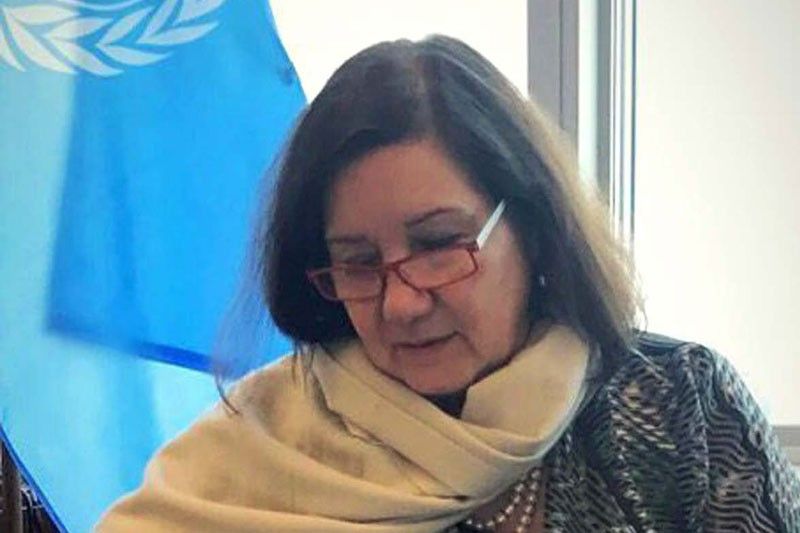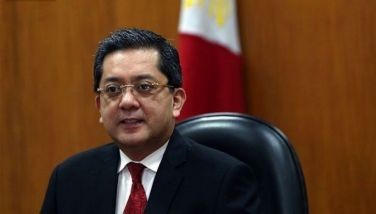ICC president urges Philippines to reconsider withdrawal

Maria Luiza Ribeiro Viotti, Chef de Cabinet of UN Secretary General Antonio Gutteres, reads the note verbale confirming the Philippines’ withdrawal from the International Criminal Court.
MANILA, Philippines — The president of the International Criminal Court said yesterday he regretted the Philippines’ announcement that it intends to withdraw from the ICC.
This developed as the Philippines formally notified the United Nations of its decision to withdraw from the Rome Statute, the treaty that created the ICC, which has started a preliminary examination of the thousands of alleged extrajudicial killings under President Duterte’s war on drugs.
O-Gon Kwon of South Korea encouraged the Philippines to remain a member and “engage in dialogue” rather than withdrawing, which he said would hurt the court’s efforts to punish war crimes and crimes against humanity.
Foreign Affairs Secretary Alan Peter Cayetano said Manila’s withdrawal from the ICC was formally conveyed in a note verbale handed by Philippine permanent representative Teodoro Locsin Jr. to Maria Luiza Ribeiro Viotti, the Chef de Cabinet of UN Secretary-General Antonio Gutteres, at 6:07 a.m. yesterday (Manila time).
The DFA and Locsin also shared photos of the letter and of Viotti, who was seen reading the note verbale.
“It is my duty to give you this. A sad day but a day sure to come because human rights has been politicized. We resisted US pressure not to join until we finally signed on only to have it weaponized against our democracy fighting an existential threat from the drug trade,” Locsin said in a Twitter post yesterday.
According to the DFA, the one-year process for the Philippines’ withdrawal from the ICC began with the delivery of the notice to the UN.
Cayetano, who is in Australia to represent President Duterte at the ASEAN-Australia Special Summit, maintained the Duterte administration’s decision to pull out the Philippines from the ICC “is a principled stand against those who politicize and weaponize human rights.”
In the one-page note conveying its withdrawal, the Philippines gave assurance to the international community that it continues to be guided by the rule of law embodied in the Constitution and its long-standing tradition of upholding human rights.
“The government affirms its commitment to fight against impunity for atrocity crimes, notwithstanding its withdrawal from the Rome Statute, especially since the Philippines has a national legislation punishing atrocity crimes,” the letter said.
“The government remains resolute in effecting its principal responsibility to ensure the long-term safety of the nation in order to promote inclusive national development and secure a decent and dignified life for all,” it added.
Cayetano blamed the “well-orchestrated” campaign to mislead the international community to crucify Duterte and the Philippines by distorting the human rights situation in the country.
“This campaign against President Duterte and the Philippines is being effectively carried out by elements who seek to undermine our government and who have successfully infiltrated the human rights community and weaponized human rights protection mechanisms to advance their goal of overthrowing our democratically installed government,” Cayetano said.
“It is doubly lamentable that members of the international community, who include our own partners in the war against terror, have allowed themselves to be used as pawns by these individuals and organizations in undermining our own efforts to restore the rule of law,” he added.
“We are, however, confident that there is no crime or liability to speak of in the first place since our campaign against methamphetamines and other narcotics is a legitimate law enforcement operation designed to protect all Filipinos and uphold the rule of law,” Cayetano said.
The DFA secretary said it has always been the position of the Philippines that states have the inherent responsibility to adopt and implement measures, consistent with their respective laws, to effectively address threats to the safety and wellbeing of their citizens.
In the case of the Philippines, Cayetano said the President has identified the proliferation of illegal drugs and its link to other forms of criminality as a serious threat to the people that had to be immediately addressed.
“The campaign we are waging against illegal drugs is consistent with the sovereign duty of any state to protect its people,” he said.
He maintained that in the conduct of this campaign, the Philippines is guided by the rule of law embodied in its Constitution, statutes and its long-standing human rights obligations.
“Contrary to what some parties are trying to make it appear, there is no failure on the part of the Philippine government in dealing with issues, problems and concerns arising from this campaign,” Cayetano stressed.
“These are dealt with by independent and well-functioning organs and agencies of our state,” he said.
Last month, the ICC launched a “preliminary examination” of reports of alleged extrajudicial killings committed by security forces as part of the administration’s campaign against illegal drugs.
ICC prosecutor Fatou Bensouda had explained the examination is not an investigation but “a process of examining the information available in order to reach a fully informed determination on whether there is a reasonable basis to proceed with an investigation pursuant to the criteria established by the Rome Statute.”
The Philippines signed the Rome Statute on Dec. 28, 2000 and ratified and endorsed it in August 2011, during the Aquino administration.
The ICC has jurisdiction over genocide, crimes against humanity and war crimes committed by state parties.
Meanwhile, the ICC said Raul Pangalangan will remain as one of its judges even if the withdrawal of the Philippines from the Rome Statute takes effect.
“Once elected and sworn in, the judges shall hold office for a term of nine years in accordance with the Statute and the principle of judicial independence,” the ICC said in a statement.
Pangalangan was elected ICC judge in July 2015 and assigned to the pre-trial division.
He filled the seat vacated by the late senator Miriam Defensor Santiago, who stepped down in June 2014 due to an ailment.
Pangalangan is a former dean of the University of the Philippines College of Law and publisher of the Philippine Daily Inquirer.
Deep concern
Meanwhile, the European Union remains “deeply concerned” about the high number of killings associated with the Duterte administration’s campaign against illegal drugs.
The regional bloc mentioned the Philippines as one of the countries that require the attention of the UN Human Rights Council.
“It is imperative to conduct prompt, effective, impartial and transparent investigations of all cases of death leading to prosecution in all cases of unlawful killing,” the EU said in a statement at the 37th Human Rights Council in Geneva.
The EU emphasized the importance of carrying out the campaign with focus on public health and in full compliance with due process.
- Latest
- Trending



























